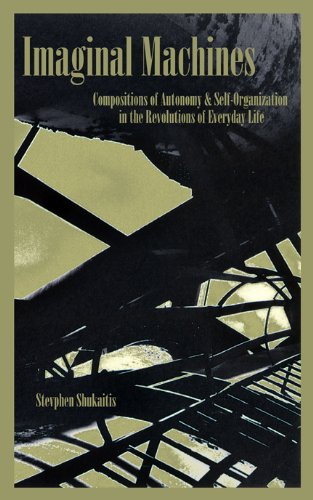Stevphen Shukaitis: Imaginal Machines: Autonomy & Self-Organization in the Revolutions of Everyday Life (2009)
Filed under book | Tags: · avant-garde, everyday, left, life, machine, philosophy, politics, revolution, social movements

“All power to the imagination? Over the past forty years to invoke the imagination as a basis for radical politics has become a cliché: a rhetorical utilization of ideas already in circulation, invoking the mythic unfolding of this self-institutionalizing process. But what exactly is radical imagination? Drawing from autonomist politics, class composition analysis, and avant-garde arts, Imaginal Machines explores the emergence, functioning, and constant breakdown of the embodied forms of radical imagination.
What does it mean to invoke the power of the imagination when it seems that the imagination has already seized power through the power of the spectacle? Does any subversive potentiality remain? Perhaps it is only honest to think in terms of a temporally-bounded subversive power. It might be that imaginal machines only work by breaking down. That is, their functioning is only possible, paradoxically, by their malfunctioning. By reopening the question of recuperation, the inevitable drive to integrate the power of social insurgency back into the working of capital and the state, we create possibilities for a politics continually reconstituted against and through the dynamics of recuperation: to keep open an antagonism without closure.”
Publisher Minor Compositions, London/NYC/Port Watson, 2009
ISBN 1570272085, 9781570272080
255 pages
PDF (updated on 2016-2-21)
EPUB (added on 2016-2-21)
ARG (added on 2016-2-21)
Scribd
Michel Foucault: The Politics of Truth (1997/2007)
Filed under book | Tags: · christianity, critique, enlightenment, ethics, hermeneutics, marxism, ontology, phenomenology, philosophy, politics, revolution, self, subjectivity, truth

“In 1784, the German newspaper Berlinische Monatschrifte asked its audience to reply to the question ‘What is Enlightenment?’ Immanuel Kant, following Moses Mendelssohn, took the opportunity to investigate the purported truths and assumptions of his ‘age of reason.’ Two hundred years later, Michel Foucault released a response to Kant’s initial essay, positioning the philosopher as the initiator of the discourse, and critique, of modernity—a credit traditionally accredited to Nietzsche. The Politics of Truth takes this initial encounter between these two philosophers, Foucault and Kant, as the framework around which these different lectures and unpublished essays are assembled. Ranging from reflections on the Enlightenment and revolution to a consideration of the Frankfurt School, this collection offers insight into the topics preoccupying Foucault as he worked on what would be his last body of published work, the three volume History of Sexuality. Foucault’s examination of Kant’s “What is Enlightenment?” is the most “American” moment of Foucault’s thinking. It is in America that he realized the necessity of tying down his own reflection to that of the Frankfurt School. Edited by Sylvère Lotringer, The Politics of Truth contains transcripts of lectures Foucault gave in America and France between 1978 and 1984, the year of his death.”
Edited by Sylvère Lotringer
Introduction by John Rajchman
Translated by Lysa Hochroth and Catherine Porter
Publisher Semiotext(e), 2007
Foreign Agents series
ISBN 1584350393, 9781584350392
195 pages
PDF (13 MB, updated on 2017-6-26)
Comment (0)Michael Löwy: Morning Star: Surrealism, Marxism, Anarchism, Situationism, Utopia (2000–) [IT, BR-PT, EN]
Filed under book | Tags: · anarchism, anti-capitalism, art history, marxism, revolution, situationists, surrealism, utopia

“This work collects the author’s essays on the ways in which surrealism intersected with a variety of revolutionary political approaches, ranging from utopian ideals to Marxism and situationism. Taking its title from André Breton’s essay “Arcane 17,” which casts the star as the searing firebrand of rebellion, Löwy’s provocative work spans many perspectives. These include surrealist artists who were deeply interested in Marxism and anarchism (Breton among them), as well as Marxists who were deeply interested in surrealism (Walter Benjamin in particular).
Probing the dialectics of innovation, diversity, continuity, and unity throughout surrealism’s international presence, Morning Star also incorporates analyses of Claude Cahun, Guy Debord, Pierre Naville, José Carlos Mariátegui and others, accompanied by numerous reproductions of surrealist art. An extraordinarily rich collection, Morning Star promises to ignite new dialogues regarding the very nature of dissent.”
Previously published in part as L’Étoile du matin: surréalisme et marxisme, Éditions Syllepse, 2000.
English edition
Introduction by Donald LaCoss
Publisher University of Texas Press, 2009
Surrealist Revolution series
ISBN 0292718942, 9780292718944
xxx+142 pages
La stella del mattino: surrealismo e marxismo (Italian, trans. Maria Novella Pierini, 2001, added on 2022-5-8)
A estrel da manhã: surrealismo e marxismo (Brazilian Portuguese, trans. Eliana Aguiar, 2002, added on 2019-2-11)
Morning Star: Surrealism, Marxism, Anarchism, Situationism, Utopia (9 MB, updated on 2019-2-11)

